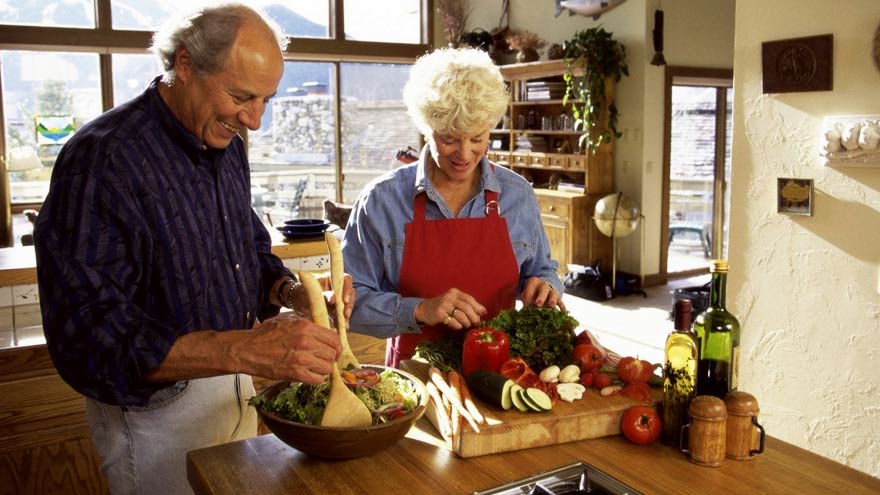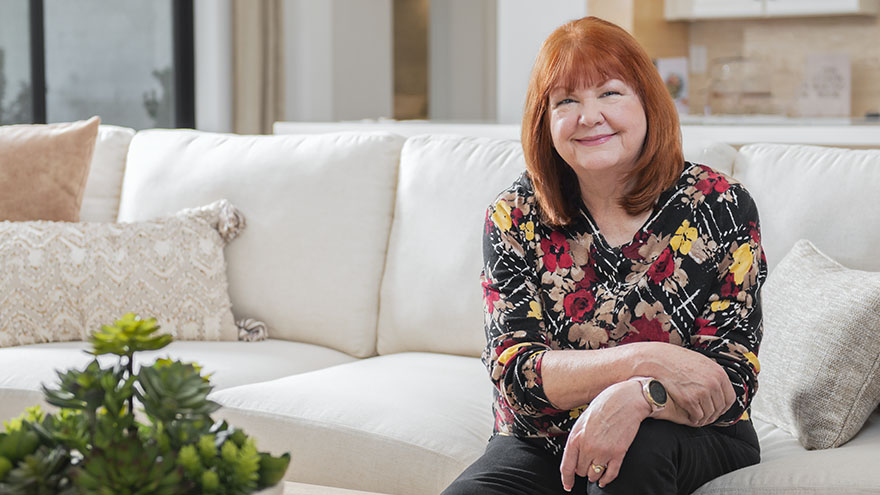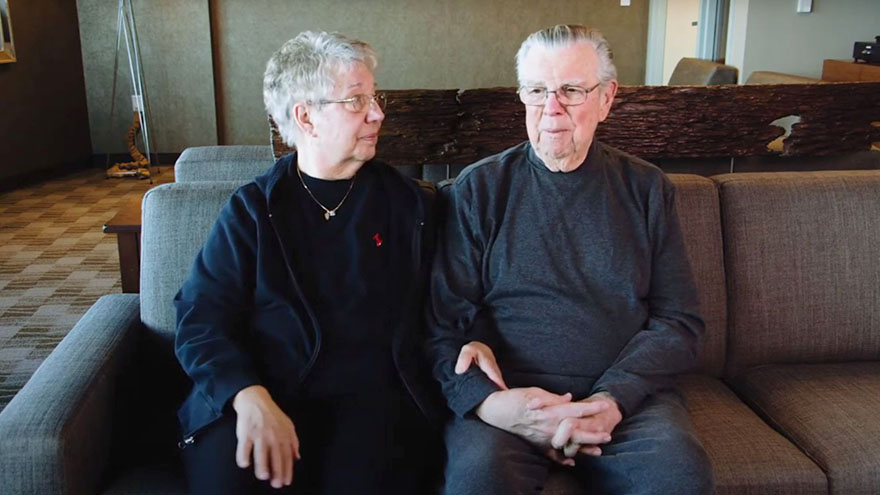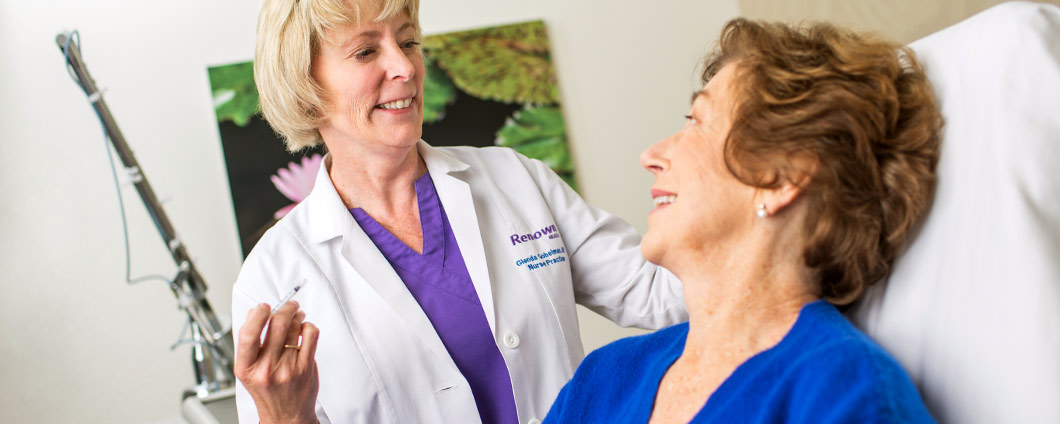Search
Results for 'doctors'
Clear-
Testosterone, Men and Health: What You Need to Know
You probably know testosterone (T) plays an important role in how boys physically develop into men. But is that all you know? What happens when a man's T levels are off? Are there symptoms men should look for? And what are the treatment options? Dr. Bobby Kahlon, MD, Renown Medical Group provides answers in a Testosterone Q&A. What does testosterone do for men? "Testosterone is known as the 'manly hormone' for a reason," says Dr. Kahlon. "Though women also naturally produce small amounts of it, men produce testosterone at much higher concentration levels. And it affects men in more physical and obvious ways. How much hair a man has on his chest, how deep his voice is, or how muscular he is are all attributable in some way to testosterone. It's also responsible in large part for sex drive and bone strength and affects how men think, learn and experience their surroundings." Testosterone in men: Powers virilization (male physical characteristics) and sexual function Builds muscle mass and strength Supports bone density Improves cognition T Trivia: Discover Magazine reveals that “manly” testosterone and other sex hormones evolved long before we did — 500 million years ago — from the ultimate “female” hormone, estrogen. Can you have too much or too little testosterone? Though high testosterone isn't a concern for most men, low testosterone or low T occurs more frequently and develops for two primary reasons. Dr. Kuhadiya explains, "Subnormal testosterone concentrations occur either due to pituitary or testicular failure and the causes for each need to be discussed with your physician." Pituitary failure: Approximately one-third of men with obesity, type 2 diabetes, or metabolic syndrome (which includes increased blood pressure, high blood sugar, excess body fat around the waist, and abnormal cholesterol or triglyceride levels) have low free — or "bioavailable" — testosterone. These health conditions can cause the pituitary gland to "fail" to release follicle stimulating hormone (FSH) and luteinizing hormone (LH) which are essential for triggering testosterone and sperm production. And that can cause low testosterone (hypogonadism). Testicular failure: Though less common than pituitary failure, testicular failure may also be responsible for low T. It's caused by diseases or illnesses affecting the testicles, injury or trauma to the testicles, or certain medicines and treatments such as chemotherapy or opioid pain medication. Providing your complete medical history to your doctor is always the first step toward a proper diagnosis. What are the symptoms of low T? The following indicators could be a sign that you have low T, say the doctors. Lack of motivation and determination, including mild depression Loss of physical endurance and muscle strength Loss of or diminished early morning erections Reduced libido (sex drive) Erectile dysfunction (ED — difficulty achieving or maintaining an erection) Gynecomastia (male breasts) Small testes T and Time: T levels in men naturally begin to decline by about 1% a year starting at age 30. How do you test for low T? "There are different methods for testing testosterone levels," says Dr. Kuhadiya. "Each approach uses a blood sample to evaluate total testosterone, which includes free and attached testosterone that combines with proteins albumin and sex hormone-binding globulin (SHBG). For the most accurate results, testing is based on samples collected in the morning after fasting, and from tests on two different days." What treatment options are available? "Well, your best natural option may be YOU," says Dr. Kahlon. "Men with pituitary failure are often able to treat their low T by losing weight to increase levels of the hormone. And even if you don't lose weight, exercise can help boost your testosterone. Unfortunately, if you have testicular failure, weight loss and exercise may not have the same effect." So, are there other options? "You may want to consider Testosterone Replacement Therapy (TRT)," says Dr. Kuhadiya. "TRT is only available to men who are hypogonadal — with a clinical diagnosis of low T. Injection, gel, skin patch and nasal spray are available TRT options. The best option is the one that works best for the patient. Convenience, insurance coverage and cost are all factors to consider." Dr. Kahlon's TRT preference? Daily gel treatments, which are applied directly to the skin. On the other hand, Dr. Kuhadiya recommends intramuscular injections, which take place once a week or every two weeks. But both doctors agree on this: physicians and their patients need to weigh the benefits and risks of TRT before proceeding with treatment — especially if your low T condition may require lifelong treatment. "In my clinical practice, I have seen some very good long-term results with an improved quality of life," says Dr. Kuhadiya. "However, in certain situations, TRT may increase the risk of heart disease and is not recommended for men with a history of prostate cancer." Dr. Kahlon adds, "Patients receiving any type of hormone therapy need to be closely monitored throughout the treatment process for any changes in their health." How do you feel about steroids and T boosters? "I don't recommend them, certainly not for hypogonadism," advises Dr. Kahlon. "There is no evidence to support anabolic-androgenic steroids or testosterone boosters as a safe or effective treatment for low T in men." "In fact, there continues to be emerging evidence they may lead to side effects that could potentially harm the liver and the pituitary and endocrine functions of the body," warns Dr. Kuhadiya. "And that damage may be irreversible."
Read More About Testosterone, Men and Health: What You Need to Know
-
5 Tips to Keep Your Brain Nimble
Not all memory loss is inevitable — there are several things you can do to keep your brain nimble at any age. Find out how brain exercises, a healthy diet and daily movement can improve your brain’s focus. A modest decline in memory is to be expected as we get older. We forget someone’s name but recall it later. We find the need to make lists to remember things more pressing. Manageable? Yes. But frustrating nonetheless. The good news is we don’t have to sit back and succumb to age-related memory loss. There are concrete things we can do at any age to keep our brains sharp, nimble and engaged. Five Simple Brain Exercises 1. Volunteer or participate in meaningful activities outside of work. This engages your brain and emotions in a healthy, positive way. 2. Engage in moderate, regular exercise to tone body and mind. Overall good health is critical to brain health. Even casual daily walking can boost your mental abilities. 3. Eat the rainbow. Choose to include plenty of colorful fruits and veggies and ease up on processed foods in your daily diet. The proper nutrients can improve circulation to your brain, which will amp up your cognitive abilities. Consult your doctor for the best diet and supplement choices for your specific health needs 4. Get a blood test to determine your body’s hormonal and nutrient levels. Specific hormones and nutrients can affect cognition. Be mindful of your cholesterol levels, and if you take cholesterol medications, such as statin drugs, be aware they can also affect your mental faculties. 5. Engage in brain activities like reading, crossword puzzles, Sudoku and Trivial Pursuit. These types of activities can improve your brain’s focus and concentration and — most important — test your memory and general knowledge. You derive more benefit by engaging in these activities consistently for short amounts of time, so make a weekly appointment with yourself to build brainpower.
-
Patty Warren A Woman of Strength and Resilience
Meet and get to know Patty Warren, our featured Sterling Silver Club member this fall. You may recognize her from the latest Senior Care Plus commercial on television, where she joins a coffee chat discussing the many benefits of being a Senior Care Plus member. She’s one of the kindest souls you’ll ever meet – and has a positive outlook on life that we should all strive for. Patty's Story Patty was born and raised in a small Kansas town called Baxter Springs, where she grew up with an older brother, an older sister and two younger sisters. She and her siblings all enjoyed playing sports like softball and basketball, in addition to playing instruments. Patty developed a love and passion for music at a young age that carried into her adulthood. “I wanted to be an opera singer,” said Patty. “I decided to go to college at Pittsburg State University in Kansas where I majored in vocal performance.” After college, Patty moved to Manhattan in New York City to audition to be an opera singer, but she soon realized it wasn’t what she wanted to do after all. She eventually decided to work in the brokerage industry. After living and working in New York for three years, Patty moved back to Kansas where she later met the love of her life, Michael. “In 1992, I had put a dating ad in the local newspaper,” said Patty. “I received over 30 responses, and I went out on quite a few dates.” Then she had her first date with Michael, and the two of them quickly realized how much they liked each other. He asked her to marry him on Valentine’s Day in 1993, and they went on to get married in front of the Justice of the Peace on May 3, just a few months later. “We had a small wedding so that we could move into our first home together,” said Patty. A few years later in 1999, Patty and Michael moved to Arizona, where they lived for 22 years. Patty worked at Edward Jones Investments for 18 of those 22 years and loved her job and the people that she worked with. She retired in January 2021 during the pandemic, and three days later she and Michael moved to Sparks, Nevada.
Read More About Patty Warren A Woman of Strength and Resilience
-
Senior Care Plus Loves Pickleball
Senior Care Plus is pleased to announce we are now a proud sponsor of Jam On It Pickleball, open to the community seven days a week at the Reno Sparks Convention Center. We’re excited to help promote this fun activity to our members, employees and the public. Pickleball has many wonderful health benefits – particularly for seniors. It’s a low-impact game that raises the heart rate, improves hand-eye coordination and increases mobility. In addition to the obvious physical benefits, pickleball is a great social activity. Getting out of the house and playing a fun, easy-to-learn game with others is a great way to make new friends while improving your physical and mental health! Ralph Barbato, a Senior Care Plus member from Reno, is a huge fan of pickleball and all it has to offer. “Pickleball has made such a positive impact on my life. I love the physical and mental health benefits along with the social aspect – it’s a great way to meet new people and I’m excited to have it in our community,” said Ralph.
-
Carl and Janis Team Approach to Renowns Healthy Heart Program
Meet a couple that's all heart. After each had a heart attack one year apart, they committed to Renown's new Healthy Heart Program and support each other along the road to heart health. Almost a year to the day that Janis VanHorn had a heart attack, her partner, Carl Edson, had one too. "That kind of doubled the dose of making sure that we were doing everything that we could to continue with our life," VanHorn says. "It's a very life-altering thing.” And after Edson's quadruple bypass open heart surgery, he was grateful for the simple act of getting into the car with the woman he loves. "I was so relieved," he says. "I didn't realize how precious life was until that moment." The couple see the same cardiologist, Richard Seher, M.D., FACC, FSCAI, who recommended they participate in Renown's new Healthy Heart Program, a 12-week, 36-visit intensive cardiac rehabilitation curriculum that includes monitored exercising and cooking classes. Now they're both familiar faces at the program, which is located at the Renown South Meadows Medical Center. After several weeks, Edson says he has lost 10 pounds and VanHorton has lost inches and feels more toned. Tackling the program together has brought the couple closer and given them the opportunity to fuel one another's health goals and longevity. "I would be lost without this man," VanHorn says," and anything I can do to help him live longer, I'm going to do that." Edson adds, "She is to me my whole life, and I mean that sincerely. There's no one else I can turn to that has helped me in my life as she has, and I'm just trying to return the favor in a big-time way. She is my everything."
Read More About Carl and Janis Team Approach to Renowns Healthy Heart Program
-
Renown Dermatology
At Renown Dermatology, Laser & Skin Care, our experienced providers offer a wide range of services, coupled with advanced medical technology. Skincare services include dermatology and competitively-priced treatments and procedures. Our professional and compassionate staff focuses on promoting lifelong health and wellness in a relaxing, modern atmosphere.
-
Meet Ann Sterling Silver Club Member
If Sterling Silver Club member Ann had an official motto, it would be, “I love to learn new things.” Ann has been a Reno resident for about 25 years after making her way to the Silver State from Arizona and before that, her birth state of Indiana. All along the way, she’s been growing, exploring and learning. Meet Ann From her days as a Girl Scout to her cherished roles as mother and grandmother and her time spent working for the federal government, Ann has enjoyed the adventures she’s had, the people she’s met and the learning opportunities that continue to be an important part of her life’s journey. “Learning never has to end,” Ann says wisely. Today, Ann lives a life full of learning — and giving. She is a member of the Osher Lifelong Learning Institute (OLLI) at UNR, which offers classes and events for people who are 50 and older. She has also been a foster grandparent for Seniors in Service and has tutored troubled teens at the Jan Evans Juvenile Detention Center and helped out at Title 1 schools. Volunteer Extraordinaire Her volunteer résumé continues with work for the Reno Police Department’s SAVE program through Retired Senior Volunteer Program (RSVP) for Sanford Center for Aging and time spent with VISTA for AmeriCorps, helping victims of domestic violence and refugees. And with her recent appearance in Ky’s Kab, a segment of Aging & Awesome — the popular 55+ show airing Saturdays at 7 p.m. on local CBS affiliate, KTVN Channel 2 — she’s a bit of a celebrity to boot! Through all of her experiences, Ann has learned something about herself and others. She looks forward to the new memories and friendships her latest membership to the Sterling Silver Club will bring. “I love being a member of the Sterling Silver Club because it’s another opportunity for me to grow, have fun, learn and socialize,” she says. And everyone at Renown is thrilled to help her do those things — and live a happy, healthy life. Please join us in welcoming Ann, one of our first members of the Sterling Silver Club. Today we have more than 2,800 members and we’re happy to be featuring members and getting to know you all along the way!
-
How Dorismae Reclaimed Her Life and Walking Shoes with TAVR
When lifelong trekker and adventurer Dorismae Weber learned her aortic valve was shutting down, she was afraid she was losing something she loved most: her daily walks. But following a trans catheter aortic valve implantation, Weber reclaimed her walking shoes — and her life. This is her story. An avid walker and traveler, Dorismae Weber’s life changed dramatically when she was exploring Mongolia and began having trouble breathing. Weber, 84, learned her aortic valve was shutting down. “It’s scary when you lose what you’ve always done,” Weber says. “I’ve walked all my life, and it’s always been the place I’ve gone to for comfort, for solving problems, for just enjoying. But all of a sudden, I couldn’t do this anymore.” Weber was not a candidate for traditional open heart surgery because she had heart surgery in the past. Then Weber learned about about trans catheter aortic valve implantation, also known as TAVR. She went to see Renown cardiologist Jake Ichino, MD, who put her through a battery of tests before performing the procedure. “Unlike the standard traditional open heart surgery, TAVR is a less invasive approach,” Dr. Ichino says. “We traditionally go up the artery of the leg with a catheter tube device and then we implant a valve without opening the chest.” After the TAVR procedure, Weber was once again able to complete her daily five-mile hikes. “When I woke up, all I can tell you is that I looked around and I thought, ‘I have a whole new life ahead of me — when I was told there was very little left,'” Weber says. She has also planned a trek just below the arctic circle with the environmental group Earthwatch. “I’m here because I had that procedure,” Weber says. “I’m here because they offered that procedure. And I’m very grateful for it, because I wouldn’t be here without it.” To learn more about TAVR, visit Renown’s Institute for Heart and Vascular Health.
Read More About How Dorismae Reclaimed Her Life and Walking Shoes with TAVR
-
Say Hello to a Bi-Weekly Call-In Show Designed to Help Aging Adults Weather the COVID-19 Storm
New, virtual community gatherings from ‘The Hello Project’ help older adults stay connected and informed during uncertain times. When The HELLO Project received a BUILD Health Challenge grant back in November to address social isolation and loneliness amongst elderly adults in Reno, they had no idea how timely and relevant the program would be. Rising to the challenge, The HELLO Project has fast-tracked programs to engage and enrich the lives of older adults sheltering in place. It Starts with Hello, The Hello Project’s bi-weekly virtual community gathering place, takes place Tuesdays and Thursdays at noon, and people can attend by calling in or joining on their computer via Zoom (See viewing information here). Each show will feature a timely topic, factual information, a chance to chat with others in the community, and ends with some good news – The Daily Dandelion. The first episodes of the virtual series featured Dr. Coard from Renown Health’s Stacie Mathewson Behavioral Health and Addiction Institute. During these informative sessions, Dr. Coard discussed anxiety and helpful strategies to deal with the stress of this pandemic. The HELLO Project also produced a four-page resource guide to direct the community to resources for staying socially engaged during these challenging times. “While we keep referring to this period of isolation as social distancing, it really should be thought of as physical distancing,” said Kindle Craig, Director of Renown Health’s Healthy Aging Institute. “Yes, to keep each other safe we need to keep our physical distance, but there is no reason we have to be socially isolated. In fact, now, more than ever, it’s important that we foster our social connections. It Starts with Hello is about just that - we feature local experts talking about everything from mental health to nutritious cooking, and then we open it up and allow time for community conversation.” A partnership between Truckee Meadows Healthy Communities, Renown Health, and the Washoe County Health District, The HELLO Project, formerly known as CARE, was initially started due to the rate of suicide in Washoe County. “Washoe County’s suicide rate is twice the national average for people 65 and older, and four times the national average for people 85 and older¹,” said Sharon Zadra, executive director of Truckee Meadows Healthy Communities. “We couldn't ignore the statistics. We had to try a new approach.” For more information on It Starts with Hello and how to join the conversation, please visit www.hellostartsnow.org and enter your email address. From there, you will receive information on how to attend the virtual community gatherings. About Renown Health Renown Health is a locally governed and locally owned, not-for-profit integrated healthcare network serving northern Nevada, Lake Tahoe and northeast California. Renown is one of the region’s largest private employers with a workforce of more than 7,000. It comprises three acute care hospitals, a rehabilitation hospital, the area’s most comprehensive medical group and urgent care network, and the region’s largest and only locally owned not-for-profit insurance company, Hometown Health. Renown has a long tradition and commitment to continually improve the care and the health of our community. For more information, visit renown.org. About Truckee Meadows Healthy Communities Truckee Meadows Healthy Communities is a collaborative of thought leaders and influencers who seek to make an impact on the health of their community. The collaborative seeks to build a model where all community members strive toward a culture of health in the Truckee Meadows. This model will include the intersection of the health, education and community development sectors in our region. Truckee Meadows Healthy Communities seeks to create a healthier community through a collective impact project. About the Washoe County Health District The Washoe County Health District has jurisdiction over all public health matters in Reno, Sparks, and Washoe County through the policy-making Washoe County District Board of Health. The District consists of five divisions: Administrative Health Services, Air Quality Management, Community and Clinical Health Services, Environmental Health Services and Epidemiology & Public Health Preparedness. More info can be found here. Source: 1. Washoe Region Behavioral Health Profile, (2018). Figure 54: Death Due to Suicide/Intentional Self-Harm by Age Group, Washoe County, Nevada, and United States, 2012-2016 Aggregate Data: pp. 42.
-
Community Recognizes 2020 Northern Nevada Nurses of Achievement Winners
Renown Health nurses are being celebrated for going above and beyond for their patients and care team colleagues. Every year, the Northern Nevada Nurses of Achievement Committee recognizes registered nurses (RNs) from across the community to celebrate their accomplishments and further the nursing profession. The committee just announced the 2020 award winners, including seven high-performing nurses from Renown Health. Nurses are at the forefront of the care teams working through the COVID-19 pandemic and 2020 has been fittingly declared the “International Year of the Nurse and Midwife” by the World Health Organization. Celebrating our nurses is more important this year than ever, and Renown is proud to be home to seven of the 2020 Northern Nevada Nurses of Achievement winners in the following categories: Clinical Leadership: Jenny Garcia, RN, BSN, supervisor of nursing in the orthopedics unit at Renown Regional Medical Center; Critical Care: Olivia Cartwright, RN, BSN, bedside nurse in the intensive care unit at Renown Regional Medical Center; Lifetime Achievement: Cheryl Jameson, RN, bedside nurse in the general surgical unit at Renown South Meadows Medical Center; Office & Outpatient: Kathleen Neilan, RN, BCN, OCN, cancer nurse navigator at Renown Institute for Cancer; Oncology and Infusion Services: Paola Espinoza, RN, BSN, supervisor of nursing in the cancer nursing unit at Renown Regional Medical Center; Rookie of the Year: Tamara Slater, RN, BSN, bedside nurse in the general surgical unit at Renown Regional Medical Center;Renown Facility Winner: Chelsea Zielinski, RN, MSN, clinical nurse educator in the neonatal intensive care unit at Renown Regional Medical Center. From a pool of over 400 publicly-nominated nurses who provide care across northern Nevada’s care facilities and hospitals, the Committee announced a total of 14 award winners during a virtual awards celebration on Friday, Aug. 28. Anthony D. Slonim, RN, MD, DrPH, FACHE; President and CEO of Renown, who worked as a registered nurse in an Emergency Department earlier in his career says, “We appreciate the work that every nurse does every day, not only for the patient in the hospital, but in all of the other settings where people come to learn how to live healthier lives. Nurses have direct influence on the outcomes of every patient, and I congratulate all 14 nurses for their exceptional achievements.” He adds, “The real winners are those patients, families, colleagues and community members who are cared for by these exceptional nursing professionals.” “We’re proud to celebrate our community’s nurses and all they do to care for patients and their loved ones,” said Jana Elliott, Associate Chief Nursing Officer, Acute Care Services. “Nursing is a true calling to serve others and there are so many incredible ways nurses go beyond their duty to provide the best care despite the intense nature of the pandemic.” “Nurses are at the core of our care teams; they provide compassionate care and advocate for patients and their loved ones in a time of need,” said Melodie Osborn, Chief Nursing Officer, Health Services. “The Northern Nevada Nurses of Achievement awards are a longstanding way of honoring our community’s most compassionate nurses.” Interview Opportunities A 2020 Nurses of Achievement winner and a representative from Renown’s nursing leadership are happy to speak on this prestigious honor, as well as what it means to be a nurse during these unprecedented times. Please email news@renown.org or call 775-691-7308 to schedule an interview. About Renown Health Renown Health is the region’s largest, locally owned and governed, not-for-profit integrated healthcare network serving Nevada, Lake Tahoe and northeast California. With a diverse workforce of more than 7,000 employees, Renown has fostered a longstanding culture of excellence, determination and innovation. The organization comprises a trauma center, two acute care hospitals, a children’s hospital, a rehabilitation hospital, a medical group and urgent care network, and the region’s largest, locally owned not-for-profit insurance company, Hometown Health. Renown’s institute model addresses social determinants of health and includes: Child Health, Behavioral Health & Addiction, Healthy Aging and Health Innovation. Clinical institutes include: Cancer, Heart and Vascular Heath, Neurosciences and Robotic Surgery. Renown is currently enrolling participants in the world’s largest community-based genetic population health study, the Healthy Nevada Project®. For more information, visit renown.org. About Northern Nevada Nurses of Achievement Shining a spotlight on the nursing profession since 1999, the Northern Nevada Nurses of Achievement Committee works to honor their colleagues and to increase awareness of nursing as a profession. The committee also supports the growth of the profession in awarding scholarships for nursing students.
Read More About Community Recognizes 2020 Northern Nevada Nurses of Achievement Winners
-
Snakes! 3 Safety Tips for Outdoor Adventures
Seeing a snake while exploring northern Nevada’s trails is somewhat rare and the chance of a snakebite is even less common. However, it’s important to make sure you’re ready for snakes and know what to do in case of a snakebite. Hiking the rugged, stunning and varied landscapes of northern Nevada is a huge draw for many who live here. But it’s important to stay alert and be prepared while you’re out exploring the natural habitats of wildlife, especially if you encounter a snake or get a snakebite. As you prep for your next outdoor adventure, remember these three tips to stay safe in Nevada’s wilderness. 1. Leave snakes alone In general, if you don’t mess with snakes, they won’t mess with you. Seeing a snake is fairly uncommon because of their body camouflage and secretive nature, which are their first defenses in evading predators. According to the Nevada Department of Wildlife (NDOW), most snakebites happen when a person tries to capture or kill the snake. Nevada is home to 52 species of snakes and reptiles, according to NDOW. Only six can be dangerous to people and pets: Western Rattlesnake (this is the most common type of venomous snake in northern Nevada, especially around Yerington and Fallon) Sidewinder Mohave Rattlesnake Speckled Rattlesnake Western Diamondback Gila Monster (these live in southern Nevada’s Mojave Desert) Venomous snakes, like the rattlesnakes, have a wide head and thick body. Non-venomous snakes are usually more slender and have a narrow head. If you see a snake on the trail and you aren’t sure if it’s venomous or not, it’s best to be safe and leave it alone by moving away slowly. 2. Wear the right gear and take care where you walk NDOW and the U.S. Department of Agriculture suggest doing the following to decrease your chances of a snakebite: Wear over-the-ankle boots, thick socks and loose-fitting long pants. Stick to trails and stay out of the bushes or tall grass. Don’t step where you can’t see. If going over a fallen tree or large rock, step on it. Don’t jump over it. A snake might be lying on the other side. Always check stumps or logs for snakes if you’re going to sit on it. If you see one or hear a rattle, move away from the area slowly. Don’t run or make any sudden movements. Don’t handle or move a recently-killed snake as it can still inject venom. And for your dog, the best way to prevent a snake bite is to keep it on a leash. 3. Know what to do (and not do) if you get a snakebite Renown Health primary care physician Aaron A. Bertalmio, MD, reminds us the odds of getting a snakebite are very low. Roughly 7,000 to 8,000 people get bitten annually and only 5 percent die according to the U.S. Food and Drug Administration. But in the event of a snakebite, here’s what to do: Get medical help as soon as possible Stay calm to help keep your heart-rate low Remove constrictive clothing or jewelry Clean the wound with soap and water if available Cover the snakebite with dry, sterile cloth or adhesive bandage if available Keep the bite snakebite area level and below your heart if possible WHAT NOT TO DO IF YOU GET A SNAKEBITE: Apply a tourniquet (a tool used to stop arm or leg blood flow) Ice the bitten area Suck out the venom You’re now prepped and ready on what you need to know about Nevada’s slithery friends so you can stay safe and enjoy the outdoors!
Read More About Snakes! 3 Safety Tips for Outdoor Adventures
-
Keeping Your Brain Healthy, No Matter Your Age
It’s true there is no cure for dementia, yet studies suggest your life choices today can reduce brain decline in the future. How important is diet to brain health? Food is the foundation of your body. Fats, carbs and protein provide the energy for your cells and metabolism. So the quality and amount of food you eat directly affects your brain. Specifically, researchers are paying special attention to the link a high sugar diet and/ or an unhealthy fat diet may have on your brain. Your brain on sugar According to the Alzheimer’s Association, when too much sugar is in the bloodstream for long periods of time, it can damage the brain cells. Many people with diabetes may develop brain abnormalities, and these changes may increase chances of dementia — research is still being done to understand this connection. Many U.S. adults have prediabetes with blood sugar higher than normal. Insulin resistance often leads to diabetes. Insulin resistance has been linked to metabolic syndrome, which is a precursor for cardiovascular and cerebrovascular disease (heart attack, stroke). Some signs of metabolic syndrome include: Large waist size (40 inches or more for men, 35 inches and up for women) Low HDL (good) cholesterol level Higher than normal blood pressure — 130/85 and above Current research suggests too much sugar in the blood causes inflammation, which can damage brain cells. High carbohydrate foods, such as sweetened beverages, chips, white rice, white potatoes, bagels, cereals and desserts, have been shown to raise blood sugar. Although anyone can get diabetes, Hispanic Americans and African Americans are at greater risk.
Read More About Keeping Your Brain Healthy, No Matter Your Age









